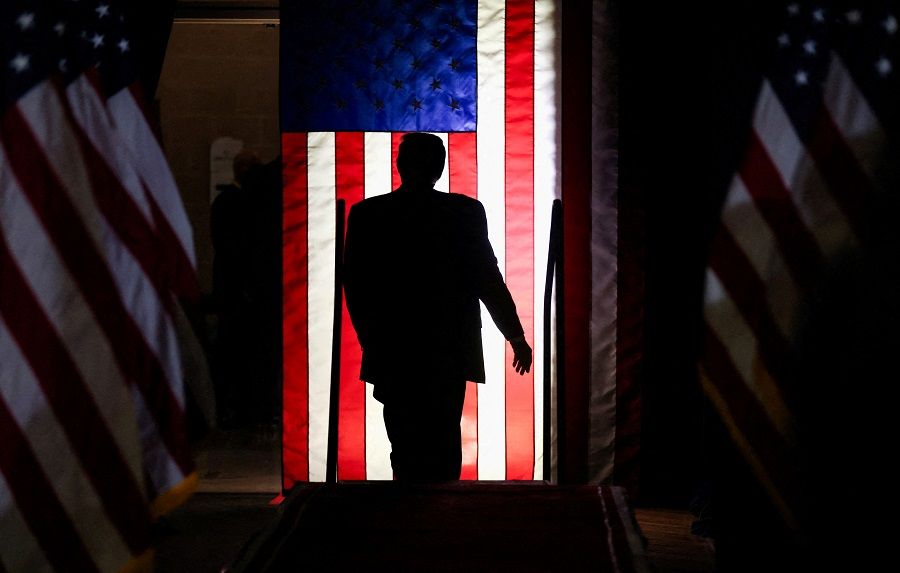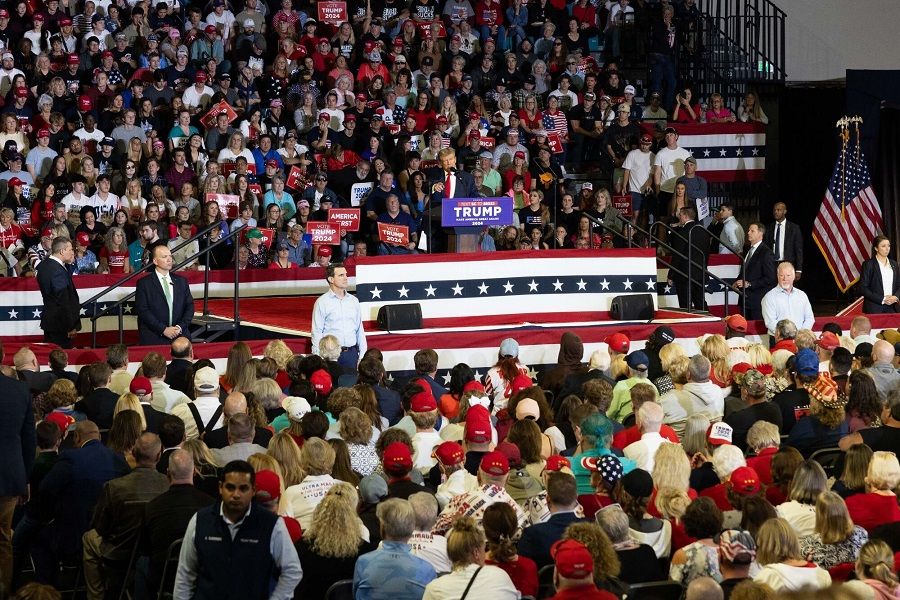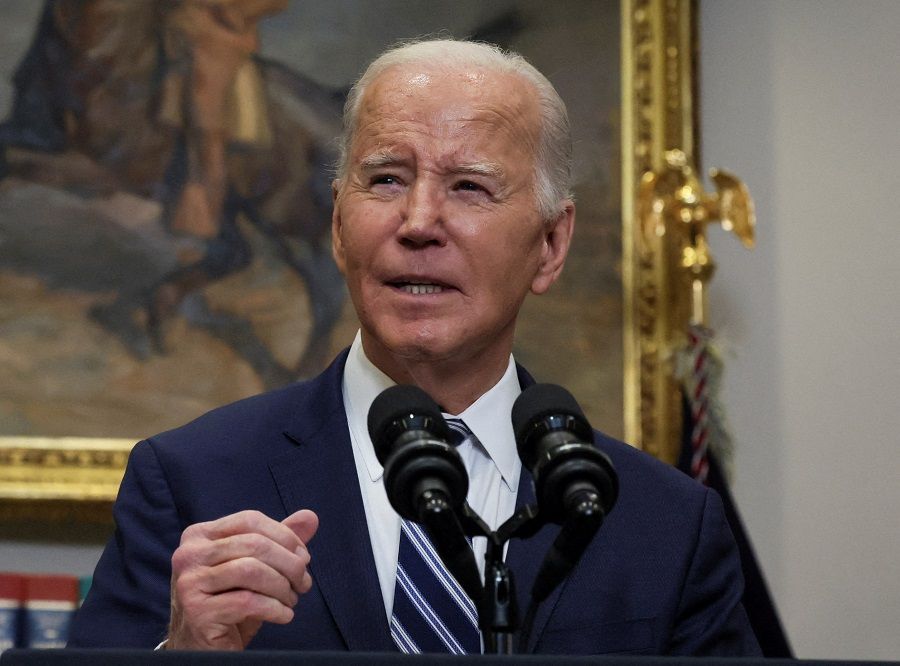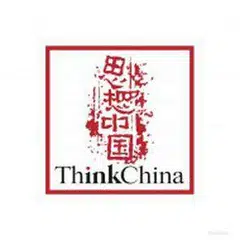US presidential election 2024: Unprecedented test of US democracy

This year marks the 248th anniversary of the founding of the US. A long time ago in 1893, whilst China was still struggling amid the ignorance and backwardness of a feudal dynasty, Czech composer Antonin Dvorak, director of the National Conservatory of Music of America in the US, released his masterpiece, Symphony No. 9 (also called New World Symphony), expressing the inspirational spirit of ambition and freedom of exploration, never seen before in the new world.
Only growing their material realms
It is worth noting that some countries and civilisations, in reflecting on growth and decline in modern history, often highlight gains in the material realm whilst staying silent on deficiencies in the spiritual realm, which is unhelpful and detrimental to future generations.
In a recent interview with an American journalist, Russian President Vladimir Putin declared that today, the GDP of the BRICS countries can rival those of advanced countries in the West.
The fact is, the main actors fuelling the GDP growth of BRICS nations - China and India - have enjoyed tremendous growth in the past three to four decades due to their integration and connection with modern civilisation.
Besides, Putin only talked about GDP growth, side-stepping societal development and the progress of civilisation. For instance, Iran, which is part of BRICS, still rules its nation with a "fusion of politics and religion", which has long been abandoned by advanced civilisations since the Middle Ages. Such a savage and outdated approach is unprecedented, and can be considered an embarrassment of the BRICS organisation, and is not worth shouting about.
Complexity of US presidential election
If we fully acknowledge, accept, and assimilate into modern advanced civilisation, we can more accurately and objectively assess the difficulties and challenges that have emerged during the process of modern civilisation's advancement and development, as well as provide guidance and inspiration for our own advancement and improvement.
The US presidential election is happening this year, and the intense competition is reaching a fever pitch. On the surface, the biggest challenge for the Democrats would be that incumbent President Joe Biden, who is seeking re-election, is past 80 and is having problems with his memory and health, which is generally worrying to the American voters.
For the Republicans, the moderates and pro-establishment camps are incapable of competing with the radical former President Donald Trump, who represents populism and "America First".
While Trump is no spring chicken either, the young Republicans were nowhere near catching up to Trump during the Republican primary elections as they fell by the wayside one by one. Trump comfortably clinched the Republican candidate nomination, and it seems he will once again go up against Biden for the position of president.
Some say that Trump has already tormented the US once, especially in November 2020 when he refused to concede defeat, throwing American democracy into crisis. Would American voters allow him to torment them a second time?
... when it comes to concrete policies and short-term impact, many of Trump's moves seem to be more impactful, swift and decisive.

On a deeper level, the upcoming US presidential election promises to be unpredictable, with factors such as culture, economy, society, ethnicity, immigration, security and so on coming together in a web of complexity.
Globalisation debate still nub of US elections
Trump is unique in that his base voters are mainly the so-called "downtrodden groups" that are a result of the new wave of globalisation, including middle-lower white Americans, traditional manufacturing blue-collar workers, culturally and politically radical anti-foreigner groups, and so on.
Overall, the latest round of globalisation has caused a huge shift in both capital and industry, helping uplift hundreds of millions around the world from poverty towards prosperity. At the same time, such globalisation has necessarily impacted the groups that used to benefit from capital flow and industry locations.
Of course, this is not negating how globalisation has brought about a wide and balanced distribution of wealth worldwide - on the contrary, it should be the direction of human development - but in the larger process, some have benefited while others have suffered; that is the inevitable objective situation.
And for the Trump-led radical populists who are attempting to reverse this process of objective development, their efforts are in fact narrow-sighted and futile.
However, the paradox is that when it comes to concrete policies, Trump's correction of unfair international trade, his clamping down on the influx of illegal immigrants coming in from the southern border, and his striking at the Iranian regime, all make sense. This is what makes him attractive to voters who embrace pragmatism.
So, if the US were to elect Trump again, they would be faced with a conundrum: from a macro perspective, self-centred isolationism will not solve the issues faced by the US and the world, but when it comes to concrete policies and short-term impact, many of Trump's moves seem to be more impactful, swift and decisive.
But the problem for the Democrats is that when it comes to its handling of certain issues (such as the illegal immigration crisis at the southern border and the Iran issue), it was indecisive and even derelict in its duties.
Democrats' policies more appropriate
For the Democrats, their policies are relatively more appropriate; the vibrancy and growth of the US economy in recent years is both recognition and reward for the appropriate policies the Democrats have adopted.
Internationally, the Biden administration has navigated various parties and maintained the US's role as a world leader, winning recognition and respect from the civilised world. But the problem for the Democrats is that when it comes to its handling of certain issues (such as the illegal immigration crisis at the southern border and the Iran issue), it was indecisive and even derelict in its duties.
This is mainly because the radical leftwing faction within the Democrats has been creating havoc for many years, severely hampering the executive ability of a Democratic government.

Naturally, Republicans have said a lot about Biden's age if re-elected, and swing voters are also concerned about this.
The Democrats' strategy has been to invite academics and experts to educate people and clear up any potential concerns. For example, recently there have been many neurologists who have said it is natural for the elderly to have some form of memory decline, but this would not affect their thinking and decision-making, and would make it more stable and rational instead. This will help ensure appropriate and balanced outcomes for any major initiatives, like the Chinese saying that old ginger is spicier (meaning that experience counts). However, it remains to be seen whether such efforts at convincing the people would be effective.
Hence, time has become a crucial factor in the competition between the two parties, and two major decisions of the Supreme Court will be key...
To sum up, both sides in the upcoming US election have clear weaknesses. Going by the logic of the lesser of two evils, the negative impact from Trump is likely to be more significant, because if he comes back, not only would it threaten and challenge the continued stability of US domestic politics and foreign policy - the biggest risk is that he would threaten and damage American democracy and the rule of law.
Trump is currently facing several lawsuits and legal disputes, and opinion polls have shown that most US voters would not vote for Trump if any one of the allegations levelled against Trump were to stand. The current strategy adopted by Trump's team is to try their best to delay sentencing, hoping that it would be pushed back until after election day - if so, Trump would then be able to pardon himself by way of presidential immunity once he re-enters the White House.
Two key Supreme Court decisions
Hence, time has become a crucial factor in the competition between the two parties, and two major decisions of the Supreme Court will be key: that is, whether a US president would have the supreme authority to act outside of the law, and whether each state in the US has the right to disqualify Trump from running in the presidential race.
Right now, it is likely that the Supreme Court would rule that everyone is equal in front of the law, but individual states would not have the right to independently decide whether a candidate is eligible for the US presidential election. It remains to be seen what will happen in the end.
If indeed everyone is equal before the law, the various cases involving Trump would quickly move into actual legal proceedings, and would not be delayed until after the elections in November. If so, whether Trump could actually get re-elected would be a big question mark.
Perhaps time is the best healer; once the US overcomes the hurdle of this upcoming election, the next round will certainly see the rise of a new generation of politicians entering the fray.

From a holistic and long-term viewpoint, the 2024 US presidential elections more or less has its share of quirks and coincidences, and would nudge the US towards a rather complicated and tricky point in history.
Perhaps time is the best healer; once the US overcomes the hurdle of this upcoming election, the next round will certainly see the rise of a new generation of politicians entering the fray. The future of democracy in the US remains bright, and the wave of modern civilisation will not cease just because of temporary obstacles and difficulties.
We can end this article with more music. In 1924, the US was in the midst of the second industrial revolution, riding the wave of great development brought about by steel and electricity.
A young composer in New York by the name of George Gershwin was inspired by the US's melting pot culture and progress in building itself, and fervently wrote his masterpiece Rhapsody in Blue. The song is uniquely American, combining the vibrant energy of street jazz with the metallic sounds of industrialisation, majestically narrated through classical music, showcasing Americans' free and passionate creative spirit and style.
After three years of the pandemic, I recently visited New York again, and went to Manhattan just to take in the streets and malls. I found that the vibrancy and freedom of the US is still going strong, while Rhapsody in Blue continues to spur the imagination - this is the true source of the greatness and strength that is American creativity.
